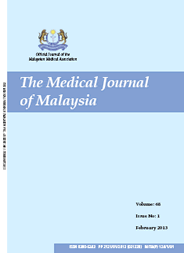MJM, Vol 70 Supplement 1 September 2015
Sexual behaviours of adult HIV positive patients
enrolled in care in Yola, Nigeria
*Department of Community Health, Faculty of Medicine and Health Sciences, Universiti Putra Malaysia, Serdang, Selangor, **Department of Psychiatry, Faculty of Medicine and Health Sciences, Universiti Putra Malaysia, Serdang, Selangor, ***Department of Pediatrics, Faculty of Medicine and Health Sciences, Universiti Putra Malaysia, Serdang, Selangor, ****Department of Community Medicine, Aminu Kano Teaching Hospital, Kano, Kano state, Nigeria, *****Department of Medicine, Federal Medical Center Yola, Adamawa state, Nigeria
ABSTRACT
Introduction: The objective of this study was to determine the effectiveness of a newly developed Clinician Client Cantered Counselling Module on improving knowledge, attitudes and sexual behaviours of adult HIV positive patients in Yola, Nigeria. The objective of this paper is to presents the baseline sexual behaviours of adult HIV positive patients enrolled into care at all four comprehensive Anti-Retroviral Therapy (ART) sites in Yola.
Methodology: Baseline reports on the sexual behaviours of adult HIV positive patients were obtained from a 3-arm randomised single blind clinical trial involving 386 randomly selected and allocated adult HIV patients who were enrolled into care at all four comprehensive ART sites in Yola. The intervention was 10 to 15 minutes clinic based Clinician Client Cantered Counselling. The three groups were; intervention group 1, intervention group 2 and the control group. An interviewer administered structured questionnaire was used for data collection. Outcome measures included; frequency of condom use in sexual activity, number of sexual partners, sex with an unsteady partner and number of spouses/sexual partners, HIV status had been disclosed to in preceding 30 days. Data was analysed using SPSS version 22. Test of significance was at α level 0.05.
Results: One hundred and one (62.4%) respondents were inconsistent condom users, 7.5% had more than one sexual partner/spouse, 5.2% had sex with an unsteady partner while 11.3% were yet to disclose their HIV status to their sex partners/spouses.
Conclusion: Inconsistent condom use, non-status disclosure and sex with an unsteady partner were the most common high risk sexual behaviours. Behavioural intervention as a positive preventive strategy is thus needed to reduce HIV spread among this group of people.
Keywords: adult HIV positive patients
